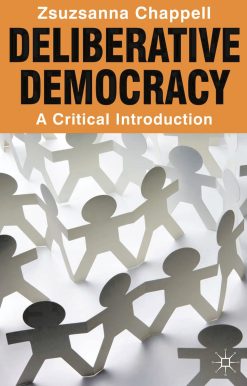Men in the Off Hours
| by |
|---|
14.00 JOD
Please allow 2 – 5 weeks for delivery of this item
Description
Anne Carson has been acclaimed by her peers as the most imaginative poet writing today. In a recent profile, The New York Times Magazine paid tribute to her amazing ability to combine the classical and the modern, the mundane and the surreal, in a body of work that is sure to endure. In Men in the Off Hours, Carson offers further proof of her tantalizing gifts. Reinventing figures as diverse as Oedipus, Emily Dickinson and Audubon, she sets up startling juxtapositions: Lazarus among video paraphernalia, Virginia Woolf and Thucydides discussing war, Edward Hopper paintings illuminated by St. Augustine. And in a final prose poem, Carson meditates movingly on the recent death of her mother. With its quiet, acute spirituality, its fearless wit and sensuality, and its joyful understanding that “the fact of the matter for humans is imperfection,” Men in the Off Hours shows us a fiercely individual poet at her best.
Additional information
| Weight | 1.9 kg |
|---|---|
| Dimensions | 1.22 × 13.16 × 2.4 cm |
| PubliCanadation City/Country | Canada |
| by | |
| format | |
| Language | |
| Pages | 176 |
| publisher | |
| Year Published | 2001-2-13 |
| Imprint | |
| ISBN 10 | 0676973566 |
| About The Author | Anne Carson was twice a finalist for the National Book Critics Circle Award; was honored with the 1996 Lannan Award and the 1997 Pushcart Prize, both for poetry; and was named a MacArthur Fellow in 2000. In 2001 she received the T. S. Eliot Prize for Poetry – the first woman to do so; the Griffin Poetry Prize; and the Los Angeles Times Book Prize. She currently teaches at the University of Michigan. |
"Carson's reputation has soared to a level equal to that of the half-dozen most admired contemporary American poets of the 21st century."—The New York Times Book Review"Anne Carson… is another of those literary treasures better known internationally than at home… She's become one of those writers other writers talk about with a kind of awe."—The Toronto Star"The most exciting poet writing in English today."—Michael Ondaatje"Carson is where the action is in contemporary poetry."—The Globe and Mail |
|
| Excerpt From Book | TV Men: LazarusDIRECTOR OF PHOTOGRAPHY: VOICEOVERYes I admit a degree of unease about mymotives in makingthis documentary.Mere prurience of a kind that is all too common nowadaysin public catastrophes. I was listeningto a peace negotiator for the Balkans talkabout his vocationon the radio the other day."We drove down through this wasteland and I didn't knowmuch about the area but I wasfascinated by the horrors of it. I had neverseen a thing like this.I videotaped it.Then sent a 13-page memo to the UN with my suggestions."This person was a memberof the International Rescue Committee,not a man of TV.But you can seehow the pull is irresistible. The pull to handle horrorsand to have a theory of them.But now I see my assistant producer waving her armsat me to geton with the script.The name Lazarus is an abbreviated form of Hebrew 'El'azar,meaning "God has helped."I have long been interested in those whom God has helped.It seems often to be the case,e.g. with saints or martyrs,that God helps them to far more suffering than they would havewithout God's help. But then you getsomeone like Lazarus, a man of noparticular importance,on whom God bestowsthe ultimate benevolence, without explanation, then abandonshim again to his nonentity.We are left wondering, Why Lazarus?My theory isGod wants us to wonder this.After all, if there were some quality that Lazarus possessed,some criterion of excellenceby which he was chosen to be calledbackfrom death,then we would all start competing to achieve this.But ifGod's gift is simply random, wellfor one thingit makes amore interesting TV show. God's choice can be seen emergingfrom the dark side of reasonlike a new planet. No use being historicalabout this planet,it is just an imitation.As Lazarus is an imitation of Christ. As TV is an imitation ofLazarus. As you and I are an imitation ofTV. Already you notice thatalthough I am merelya director of photography,I have grasped certain fundamental notions first advanced by Plato,e.g. that our reality is just a TV setinside a TV set inside a TV set, with nobody watchingbut Sokrates,who changedthe channel in 399 B.C. But my bond with Lazarus goes deeper, indeednausea overtakes me when faced withthe prospect of something simply beginning all over again.Each time I have toraise my slate and say"Take 12!" or "Take 13!" and then "Take 14!"I cannot restrain a shudder.Repetition is horrible. Poor Lazarus cannot have knownhe was animitation Christ,but who can doubt he realized, soon after being ripped out of hiswarm little bed in the ground,his own epoch of repetition just beginning.Lazarus Take 2!Poor drop.As a bit of salt falls back down the funnel. Or maybe my pityis misplaced. Some people think Lazarus lucky,like Samuel Beckett who calls him "Happy Larry" or Rilkewho speaks ofthat moment in a gamewhen "the pure too-little flips over into the empty too-much."Well I am now explaining why my documentaryfocuses entirely on this moment, the flip-over moment.Before and afterdon't interest me.You won't be seeing any clips from home videos of Lazarusin short pants racing his sisters up a hill.No footage of Mary and Martha side by side on the sofadiscussing how they manageat homewith a dead one sitting down to dinner. No panel of expertsdebating who was really the victim here.Our sequence begins and ends with that moment of completeinnocenceand sport–when Lazarus licks the first drop of afterlife off the nippleof his own old death.I put tiny microphones all over the groundto pick upthe magicof the vermin in his ten fingers and I stand back to waitfor the miracle. |
Only logged in customers who have purchased this product may leave a review.
Related products
-
On backorder 2-5 Weeks to Arrive
120.00 JOD -
On backorder 2-5 Weeks to Arrive
7.99 JOD -
On backorder 2-5 Weeks to Arrive
14.99 JOD -
On backorder 2-5 Weeks to Arrive
37.99 JOD






Reviews
There are no reviews yet.